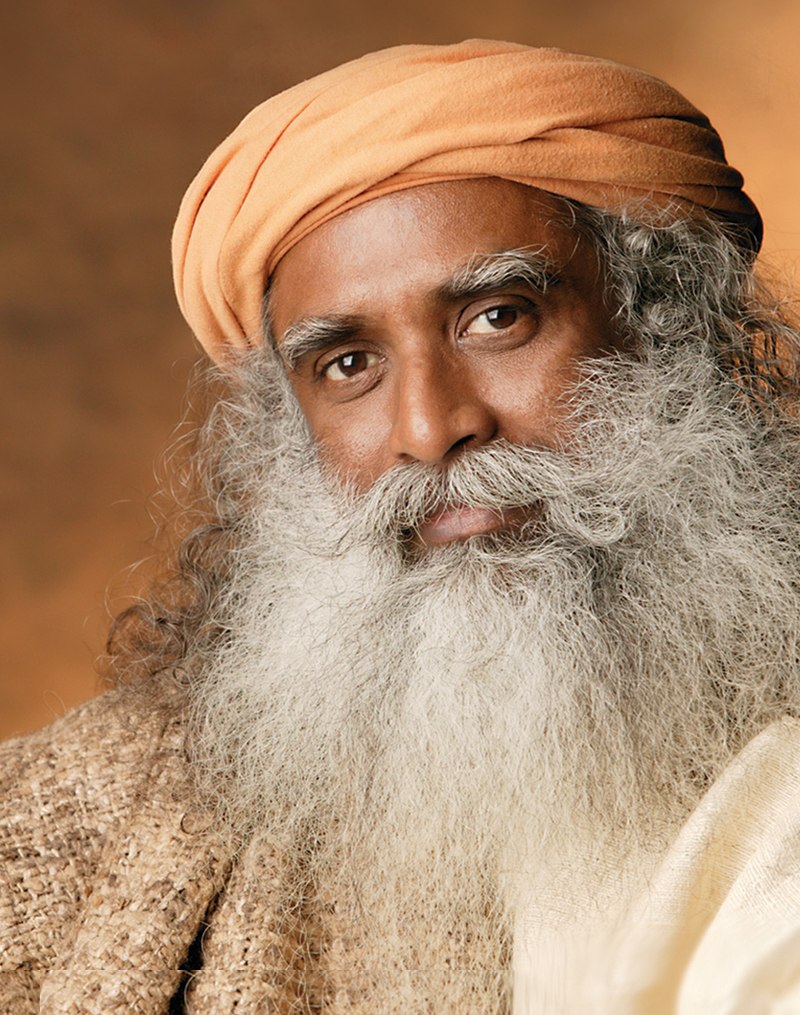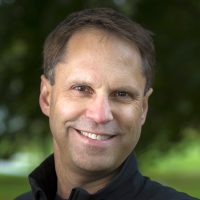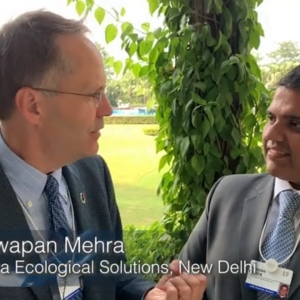Speakers
Sadhguru
Sadhguru is the founder of the Isha Foundation
J. Carl Ganter
J. Carl Ganter is co-founder and director of Circle of Blue, the center for frontline reporting, research, and analysis on water resource issues and their relationship to food and energy in a changing climate.
A conversation with Sadhguru following his panel at the World Economic Forum’s India Economic Summit.
Transcript
J. Carl Ganter: I’m J. Carl Ganter here at the World Economic Forum’s India Economic Summit, and I’m here with Sadhguru, who had just finished a panel. Thank you so much. If there was one thing talking about water and talking about the world and human impact, what have we seen about human’s actions? What’s wrong, and then how do we make a shift in the value of water, and how we value water?
Sadhguru: Most human beings are looking at soil, food, water, air as commodities that you can buy and sell. These are life-making material. Two-thirds of your body’s water, two-thirds of the planet is also water. If you’re looking for life, you look for a drop of water. So when you treat a life-making material like a commodity or there is a price to it, that’s a price we are beginning to pay.
J. Carl Ganter: Okay. So, we’re talking about a price and a value. So then, how do we shift the values? Because if we’re a values driven society, then some of those directions tend to change. Are you seeing some of that change?
Sadhguru: So, you can change your values, but without changing the basic way we operate in the world. Or you can change the values, but if you don’t change the practices, nothing is going to change. So, what we need to focus right now on practices. For example, I’m picking on agriculture because it is the biggest land user and also biggest water user on the planet.
The way we eat is ecologically disastrous. The way we dress is ecologically disastrous because the third largest polluter on the planet is textiles. Most people don’t know this. So, everything that we do has become violent in the world. The very way we exist. So, this transformation needs to happen, more understanding of not of ecological sciences, more of life in terms of that this life can only happen if everything else is well. This is slowly sinking into people.
I feel in terms of awareness, substantial work has been done, but now it is time for action. Because if action doesn’t happen now, the window of action that we have, once we miss that, then what we need to do will be much more, and the pain that we will go through as humanity will be much more.
People think planet is in peril. No, planet is not in peril. Don’t you worry about Mother Earth. She will bounce back. Only human life could become very cruel if you don’t handle it now.
J. Carl Ganter: So in the session we just attended here at the Economic Forum, I think there was a sense of relief actually in your frankness. You brought up some issues that others are reluctant to bring up.
Sadhguru: That’s my trouble, always. All the religious groups that are against me because I’m talking about population. They want more souls, I want less on the planet.
J. Carl Ganter: Okay. So on this time frame though, you talk about more action. Are you seeing that action, and then how do we talk about scale also? We have a time window. How do we make that time window?
Sadhguru: There is action, but definitely the scale is inadequate. So, that’s what we are trying to raise right now. Rally For Rivers brought in policy changes very quickly because we got 162 million people supporting the rally. Within two and a half to three months, the policy changes, recommendations happened, and now we are in currently calling in a particular river basin, which covers about 83,000 square kilometers. We want to turn one third of it into green cover or through agro-forestry.
So, this means we need to plant 2.42 billion trees. That looks like a big number, but that’s not a big number when it’s seen as a crop. So, that’s what we’re doing for this. Some changes in law are needed because the farmers were not allowed to fell and transport their trees. So now, we’re changing the laws. The central government, as the minister said, you were there for the session. Also, all the state governments have agreed that they will relax these laws, and they’re also giving four-year subsidy for the farmers to shift to agro-forestry.
J. Carl Ganter is co-founder and director of Circle of Blue, the internationally recognized center for original frontline reporting, research, and analysis on resource issues with a focus on the intersection between water, food, and energy.





